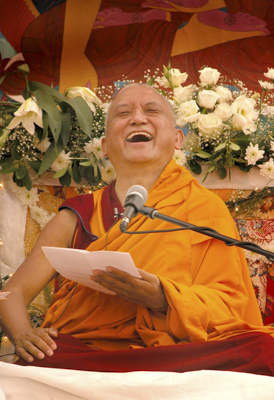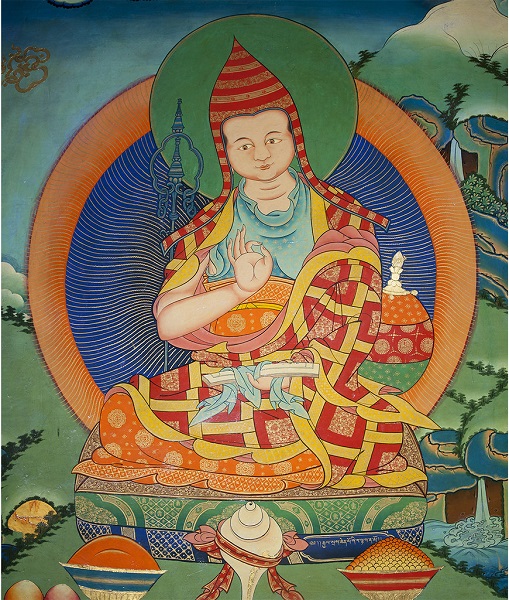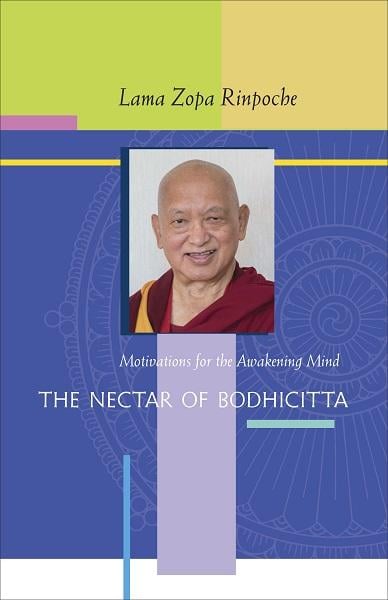Dear Friends,
As you know, Saka Dawa is a powerful merit-multiplying day, and our precious teacher Lama Zopa Rinpoche has outlined many practices we can do at this special time. One of these is, of course, the practice of generosity, and what could be better than contributing to the Lama Yeshe Wisdom Archive Publishing Fund? Your donations allow us to publish and distribute more books like Lamrim Year and The Nectar of Bodhicitta, which contain the teachings of our impossibly kind gurus, Lama Yeshe and Lama Zopa Rinpoche, and to prepare more of their teachings for publication by Wisdom Publications. So please make your contribution now! Thank you so much.
And speaking of donations to the Archive, now is a great time to make a stock donation! With the recent market gains, you can benefit from the associated tax deductions while at the same time offering countless benefits to all beings through supporting the work of the Archive. Please contact us for more information.
From the Video Archive: Pursuing the Holy Mind with Vajra, Bell and Damaru
This month from the video archive we present Lama Zopa Rinpoche explaining the significance of the vajra and bell and the damaru according to practice commentary by Panchen Losang Chökyi Gyaltsen. These instructions were given during the 64 Torma Offerings to Kalarupa (drugchuma) teachings at Land of Medicine Buddha in Soquel, California, November, 2005.
Visit and subscribe to the LYWA YouTube channel to view dozens more videos freely available from our archive. See also the FPMT YouTube channel for many more videos of Lama Zopa Rinpoche’s teachings.
On the LYWA Podcast: Lama Yeshe Rides the Radio Waves
 This month on the LYWA podcast we hope you enjoy listening to this radio interview with Lama Yeshe on the "What's Cooking?" radio show with Judy O. This wide-ranging interview took place in Boulder Creek, California on July 22, 1983 just before Lama offered public talks at UC Santa Cruz on the subject of "Anxiety in the Nuclear Age." You can also watch video of Lama giving these public talks as well as experience a multimedia presentation of these teachings, edited by Nick Ribush and created by Megan Evart.
This month on the LYWA podcast we hope you enjoy listening to this radio interview with Lama Yeshe on the "What's Cooking?" radio show with Judy O. This wide-ranging interview took place in Boulder Creek, California on July 22, 1983 just before Lama offered public talks at UC Santa Cruz on the subject of "Anxiety in the Nuclear Age." You can also watch video of Lama giving these public talks as well as experience a multimedia presentation of these teachings, edited by Nick Ribush and created by Megan Evart.
The LYWA podcast contains hundreds of hours of audio, each with links to the accompanying lightly edited transcripts. See the LYWA podcast page to search or browse the entire collection by topic or date, and for easy instructions on how to subscribe.
What's New on Our Website
 This month in our featured short video from FPMT's Essential Extracts series, Lama Zopa Rinpoche explains that everything comes from karma, therefore freedom is in our hands. Because of karma we can create happiness or suffering, enlightenment or hell. You can find links to the video here, or visit FPMT’s Essential Extracts webpage to browse the entire collection.
This month in our featured short video from FPMT's Essential Extracts series, Lama Zopa Rinpoche explains that everything comes from karma, therefore freedom is in our hands. Because of karma we can create happiness or suffering, enlightenment or hell. You can find links to the video here, or visit FPMT’s Essential Extracts webpage to browse the entire collection.
We have a new German translation of Joyful Parents, Successful Children, (Glückliche Eltern, Erfolgreiche Kinder) by Lama Zopa Rinpoche and translated by Dr. Tina Sabel-Grau. In this book, Rinpoche explains how we can teach our children the good qualities and behavior that are essential for achieving every type of happiness, both short- and long-term.
There is also a new Polish translation of Chapter One of Joyful Parents, Successful Children. This chapter, translated by Michał Czernuszczyk, is available as a free PDF file.
The Italian translation of The Joy of Compassion (La gioia della compassione) by Lama Zopa Rinpoche is now available from Nalanda Edizioni. And newly added to our German translations page this month is Life, Death and After Death, by Lama Yeshe and Lama Zopa Rinpoche, published as Leben, Tod und nach dem Tod by Aryatara Publications at Aryatara Institut.
 Every month we share new advices for Lama Zopa Rinpoche’s Online Advice Book, adding more than 100 new entries every year on a variety of topics. There are now more than 2,200 of Rinpoche’s precious advices online! Read on to learn what Rinpoche wrote to a student that rescued baby possums while on retreat:
Every month we share new advices for Lama Zopa Rinpoche’s Online Advice Book, adding more than 100 new entries every year on a variety of topics. There are now more than 2,200 of Rinpoche’s precious advices online! Read on to learn what Rinpoche wrote to a student that rescued baby possums while on retreat:
- The Quickest Way to Achieve Enlightenment: A student had rescued baby possums and cared for them after their mother was killed on the road. Rinpoche thanked the student and related the stories of Asanga and the wounded dog, and Getsul Tsimbulwa and the leper, as examples of compassionate action.
- What to Do with Cremated Ashes of a Loved One: After her husband’s death and cremation, a student had planned to bury his ashes in the garden. Rinpoche advised it was important to first consecrate the ashes by doing jangwa, a purification ritual to benefit the deceased. Rinpoche also recommended putting the consecrated ashes in tsa tsas.
- Feng Shui and Practices to Remove Obstacles: Rinpoche gave this advice to a student was experiencing many problems with relationships and other issues.
- Experience the Cancer for All Sentient Beings: A student wrote that her breast cancer had returned after a long remission. Rinpoche recommended several practices and gave extensive advice on how to utilize the illness on the path to enlightenment.
You can always find a list of all the newly posted advices from Lama Zopa Rinpoche on our website.
PLEASE REMEMBER US THIS SAKA DAWA
As always, thank you so much for all your support and generosity. If you would like to make a contribution to the publication of more of Lama Yeshe’s and Lama Zopa Rinpoche’s teachings on this special day, please do so here! Thank you.
Please enjoy this month’s teaching, an excerpt from the forthcoming Nectar of Bodhicitta.
Big love,

Nick Ribush
Director
THIS MONTH'S TEACHING: Lama Zopa Rinpoche ON the twofold benefit of bodhicitta
 All sentient beings want to avoid all the countless sufferings of samsara but they don’t understand that the only way to do that is to practice Buddhadharma. Even though they don’t realize it, they need more than just relief from the gross physical sufferings, they need relief from all suffering and that means attaining a better rebirth and progressing on the path to enlightenment. For any of these aims to succeed, bodhicitta is needed. In his next verse, Shantideva says,
All sentient beings want to avoid all the countless sufferings of samsara but they don’t understand that the only way to do that is to practice Buddhadharma. Even though they don’t realize it, they need more than just relief from the gross physical sufferings, they need relief from all suffering and that means attaining a better rebirth and progressing on the path to enlightenment. For any of these aims to succeed, bodhicitta is needed. In his next verse, Shantideva says,
[1:8] For those who wish to pacify the myriad sufferings of samsara
And to relieve all sentient beings from their sufferings,
And, besides, who wish to enjoy the myriad happinesses,
Bodhicitta should never be renounced.
Here Shantideva shows the twofold benefit of bodhicitta, where we have the ability to destroy all our own suffering completely and therefore attain all the levels of happiness, while at the same time guiding all beings from their suffering into limitless joy. Whatever happiness we wish is ours, from mundane happiness to the happiness of the god realms, and of course the great happiness of nirvana, the sorrowless state, all the way to the ultimate state of full enlightenment. All this is accomplished by bodhicitta, therefore we should never at any time forsake the wish to attain bodhicitta and, when we do attain it, we should hold it forever at the core of our heart.
If we want great happiness, if we want ultimate happiness for ourselves, we must cultivate and keep bodhicitta. If we want great happiness, ultimate happiness for all others, we must cultivate and keep bodhicitta. Bodhicitta should be the motivation for everything we do, from studying the Buddhadharma to simple everyday activities. With bodhicitta as our only goal, we are making the most of this life, the best preparation for our death and the best insurance policy for all our future lives.
Even having the chance to train our mind in bodhicitta for one minute is unbelievable. Just a minute’s meditation on bodhicitta prepares the way for a happy life and a wonderful death and gives us the chance to secure a rebirth where we can continue our spiritual path.
This is the pure thought, the essence of which is solely caring for others more than we care for ourselves. This is a total thought transformation, from our current sense that we are the center of the universe, the most important thing in our world, to one where we are the willing servant of all other beings, the least important of them all. This is not a mind that is exclusive to Tibetan Buddhists. It can, and should, be cultivated by everybody, no matter what religion, skin color, profession or age. It should be cultivated by rich and poor, by parents and children—by everybody.
The sufferings of samsara that have been with us all since beginningless time are countless and endless, and ordinary, mundane solutions will not rid us of them. The best solution, the only solution is to generate bodhicitta. This is the one infallible remedy to all our own sorrows and the one way we can help all others be relieved of their sorrows. This is the meaning of this verse, how of course with compassion and bodhicitta we focus solely on others and hence are able to benefit them hugely, but also because of the power of that selfless wish we are able to ultimately benefit ourselves.
So this wish encompasses everybody. Perhaps if there were a being who genuinely wished only to continue in the suffering realm, who wished never to have even the slightest samsaric or divine happiness, our altruistic wish would not be relevant. That being wouldn’t want or need our help and consequently, for that being alone it would be unnecessary to practice the stages of the path all the way to bodhicitta and enlightenment. But such a being doesn’t exist. All beings want only happiness and freedom from suffering. No matter what manifests on the surface, even if they seemed to embrace suffering as if they loved it, still they are seeking some kind of happiness. All beings want complete happiness, the happiness of liberation, but most don’t know what liberation is and hence they crave only mundane happiness, mistaking it for real happiness. Without our altruistic help they will be denied even mundane happiness.
Therefore, it is not enough that we want ourselves to be free from all suffering, we need to see that all sentient beings have exactly the same right to be happy as us and we need to work solely for their happiness. And we need to start now. There is no use in delaying and thinking we will practice Dharma tomorrow or when we retire. That pure motivation to attain enlightenment in order to free all sentient beings from suffering can be generated right now, right this minute.
Because it’s impossible to harm any living being with the pure thought of bodhicitta, we are bringing peace to all living beings; we are bringing peace to the world. Whatever actions we do, whatever words we speak, whatever thoughts we have, they are all solely to lead others from suffering and into happiness.
Negative emotions are the cause of disturbances and anger, of fights and disharmony. On a personal scale they break up friendships and families; on a world scale they cause wars and countless deaths and misery. The altruistic mind, on the other hand, causes only peace, to our friends, to our family, to the world and to ourselves. So, just as the disturbed mind brings all suffering, the bodhicitta attitude of peace brings all happiness. Therefore, this is the quickest way to bring world peace.
No matter how many people work tirelessly, no matter how many organizations and government bodies spend countless billions of dollars, all trying to stop war and bring peace, if they only focus on developing external factors and ignore the real cause of disharmony and conflict, the selfish mind, then they will all fail. We need to work toward defeating the selfish mind by developing the selfless mind in ourselves and by helping others develop it.
The problems of this world do not lie with not having enough material things but in the minds of hatred and greed. Because of neediness, people take what belongs to others or feel jealous when somebody has more. One person hates another and wants to harm them; one country sees another as the enemy and invades it to take its resources. But the problem is not lack of external resources, it is lack of inner peace. War can never bring peace. To kill another being for our own happiness is nonsensical even on a mundane level; on a deeper karmic level it is a fundamental cause of terrible suffering. Peace is only possible through destroying our inner enemy, ignorance, not external enemies.
As we have seen when we looked at the wonderful verses from The Jewel Lamp, Khunu Lama calls bodhicitta the best medicine, curing all diseases. This is why we should never renounce bodhicitta. Bodhicitta is the best medicine, the best method, the only way to ensure the great peace of enlightenment for ourselves and others. Nothing else will get us there. If we have not generated bodhicitta, this should be our one great goal; if we have generated it, we should never let it degenerate and must always remind ourselves of its supreme importance.
Excerpted from the forthcoming The Nectar of Bodhicitta. Compiled and edited by Gordon McDougall.





























